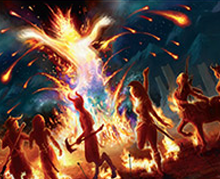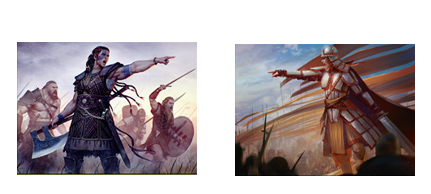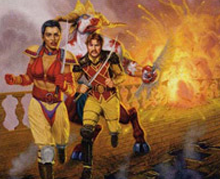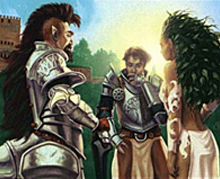Have you ever sat down at a table expecting to have a good time, only to end up disliking the person you are playing against? With hundreds of thousands of people playing Magic worldwide there’s a good chance that it has happened or will happen at some point, so let’s talk about that.
What is “Fun”?

Fun noun \ˈfən\:
- Someone or something that is amusing or enjoyable : an enjoyable experience or person
-
An enjoyable or amusing time
-
The feeling of being amused or entertained
The definition of fun is relative; it can mean or be associated with different things depending on the individual. Just because one person thinks something is fun, that doesn’t necessarily mean that everyone else will think it’s fun, or should necessarily be forced to.
Part of life is about having fun; everyone deserves to experience at least a little bit every once in a while. It’s what keeps us happy during stressful times and creates good memories, even if those memories are made with total strangers because they may become acquaintances, who may become friends.
There can be times where one person’s idea of fun doesn’t exactly match another’s and when two people of opposing ideals are forced to play against each other, it can cause issues. And when both people have paid to enter an event where prizes are on the line and are out to prove something to themselves or others, it can further agitate the situation.
Common Arguments and Misconceptions

Having spent a LOT of time dealing with this kind of issue, there are a few arguments and statements that come up again and again and I’d like to take a moment to address them.
“Casual/Competitive is the best/most fun way to play.”
Along with the definition of fun, the definition of ‘best’ is relative. Fun in what way? Best to who? Best when compared to what criteria? If I want to play competitively, playing casually isn’t the best or most fun. If I want to play casually, playing competitively isn’t the best or most fun. Saying that something is generally the best or most fun isn’t an actual argument when the definitions of both are based on preference, the individual and circumstances.
“Competitive players are bullies.”
Statements like this are misleading because they use the logic of “all puppies are dogs, therefore all dogs must be puppies”. Being a bully isn’t exclusive to being competitive; if a casual player habitually intimidates others into playing or believing the same way they do, that person is defined as a bully and it can have adverse effects on others.
This same argument can be said about things like “Casual players are bad at the game”. Just because some number of casual players are lacking in skill or experience, doesn’t mean that all people who choose to play casually are.
“Casual players don’t care about winning/competitive players only care about winning.”
Both types of players care about winning to some extent, they just prioritize it differently. Casual players approach the game with more creativity or self-expression and winning is a byproduct of getting to play with cards they like. Competitive players approach the game with more of a focus on metagaming and playing something that will give them the best chances of winning, with creativity or self-expression being the byproducts.
“Casual/Competitive doesn’t make sense to me.”
This is more of a problem in low-effort pursuit of understanding than anything else and I think sometimes we can forget that the path to understanding each other is a two-way street. If Casualtown and Competitiveburg are trying to send shipments to each other but they don’t have their doors open to receive those shipments, neither place is going to be able to benefit from them.
Fun en Masse

Sometimes beneficial and positive things can happen within a community and it ends up being a very good and profitable thing for everyone involved. Other times small problems can escalate and they can affect groups of people or even an entire community. On that note, I’d like to share a personal story.
In 2007 I decided to venture out and start playing regularly at a game store, for open play in the afternoons. Things were fine for a few months and the environment was dominantly casual with the only real structured play being Standard during FNM, which was composed mostly of $50 budget decks and casual homebrews that were made up of cards that we opened or traded from boosters we bought at the store. At one point we noticed that 3-4 new people were showing up to every FNM with significantly more optimized and expensive decks and they would go 4-0 every single Friday and split the winnings among themselves. This got so repetitive that more than half of the casual players got fed up and left to find another store or just stopped playing entirely. I kept going just for the open nights but I kept seeing less and less people stop by during the week; instead of 10-12 every night it was down to 3-4. Before the scene of competitive players arrived, the store would fill almost every one of it’s 40-something seats and after a few months of the competitive players winning every FNM, they were lucky if the Standard event even fired. The shop ended up going out of business because there weren’t enough people left to support it; the smaller competitive crowd scared away the larger casual crowd.
Something similar but opposite almost happened to a college friend of mine; there was a large competitive crowd at his LGS and small group of casual players ended up convincing the store owner to change the prize payouts, from costing $5 for entry with top 8 getting several booster packs to being free to enter but the only prizes were the FNM promo cards. The competitive players knew that a store across town had better prize payouts so they moved to that store until the old store changed their prizes back to something in between, that could satisfy both casual and competitive thirsts. Thankfully it ended up working out for everyone, and every member of that community ended up being happy with what happened. Speaking of community…
Thoughts from the Community

I recently made a post on Reddit, asking players a few questions related to casual VS competitive play. I got numerous responses across multiple subreddits and I’ve highlighted the ones that I think touch on the topic the best. They had this to say:
What does Casual mean to you? What does competitive mean to you?
frogdude2004: “A casual player doesn’t mind losing if they get to do what they set out to do. They’re in it for socializing or for expression of creativity (look what I made). Winning is the most important thing for a competitive players. Note, this does not mean they have to be on the best deck possible. A competitive player on a budget is still prioritizing winning, that’s their goal, but they’re limited in what they can work with. The budget player knows he’s got an uphill battle, and is likely realistic about what they can achieve, but they’re still pushing that limit.”
This brings up an excellent point that I didn’t think about and I don’t think a lot of other players think about; you shouldn’t hesitate to call yourself a competitive player even if you might not have the budget to play something that is widely considered ‘competitive’. I think this is important to keep in mind when talking to players who are trying to break into a format with a cheaper deck; it may not run the most optimal cards or fastest strategies but you should still give 110% if your goal is to improve at the game.
FudoJudo: “Casual means that the mutual goal of the players is to have fun. This means that the decks can be as janky as one likes, and things like take-backs and joke moves are no big deal. In a multiplayer game, this means politics takes kind of a back seat.
Competitive means that winning is the sole objective. Mistakes will be held against you by your opponent and they’ll most likely be annoyed by any joviality. Fun takes second or third place in these games to raw deck efficiency and beating your opponent no matter what.”
One of the common complaints that I often see about competitive players is that they seem to have a “no bs” attitude and will try to rule lawyer their way into a win. While rule lawyering seems to definitely be more prominent and practiced with a competitive attitude, I don’t think it’s exclusive to it either.
I also think it’s an issue that competitive players are seen as never seeming to have fun outside of first place. Although I don’t think it’s accurate to suggest that being competitive means you can’t have fun outside of first place, I know of people who definitely fit the bill and it’s an issue that I think we should all be aware of and work on not falling into.
Komatik: “Casual is more of an atmosphere and attitude than a place or a style of deck: It’s sitting around the table with friends to have fun. You can play casually with cutthroat decks perfectly well.
Competitive: Really trying to win, and doing your darnedest at the tournament should you be at one. Throwing excuses to the bin and trying to do the best you can. If you limit yourself somehow (eg. you don’t ever want to play anything but Goblins or just dislike the best decks at the time), own it and don’t make excuses. Hone your deck, hone your play. Play to win.”
I really like this response because it suggests that casual and competitive can be fluid and change on the environment and not necessarily be a way of life that we carry with us. It also shows how elements of both types of play can be mixed and used to compliment each other.
What kind of beliefs, traits or ideals do you think are shared by casual or competitive players?
johnjust: “As a casual player, I believe that the game is at its best when everyone has a chance to play their deck and anyone could win. It’s still interactive (removing other threats, etc), but you’re mostly building your machine. This isn’t to say a control deck couldn’t be casual, but maybe running all counterspells with milling your opponent through draws isn’t the way to go. Playing to win isn’t a bad thing, but playing so cutthroat that you’d deprive others of a having fun seems like you’re playing a little too competitively. On the other hand, if there’s a reward to be had – by all means, play as cutthroat as you want.”
frogdude2004: “I think efficient play is important to both. A casual player likes to see efficient synergies between cards (e.g. I’m working on making a deck with Asylum Visitor + Words of Waste). As a casual player, I’m looking to make my engine run. As a competitive player, I’m trying to get my tuned deck to run optimally. I think both try and reach some sort of optimization, it’s just what they’re optimizing is different. Ultimately, both want to have fun. They just have fun in different ways. Competitive players primarily derive fun from winning through tight play, casual players primarily have fun through social interaction or expressions of creativity.”
I liked the first response because it suggests that there is a time and place for everything. If we are playing in a relaxed environment where nothing is on the line except for bragging rights, it should be a sign to relax and shift priorities into playing something amusing instead of playing something that is guaranteed to steamroll the whole room. On the other hand if people have paid to enter an event and prizes are on the line, people should be allowed to play whatever they want to play and everyone who signs up needs to realize that and be okay with it.
The second response was interesting because it explains that both types of players have the same goal in mind except the goal is defined differently and they try and reach the goal in different ways.
How has casual/competitive play affected you or others in a positive way? In a negative way?
KingOfSweden1: “Playing competitively is really fun and added another layer of fun to a game I already really liked. Personal achievement mixed into your hobby of choice is a potent mixture. I think as long as you aren’t playing only to validate yourself, as I’ve definitely seen some people do, playing competitively is a very healthy thing for the game and for players who are interested in it.”
FudoJudo: “To be honest, I have a lot more fun playing against opponents who are also having fun. For me, it’s tiring and stressful playing against a very serious opponent. If I can’t wisecrack or make a joke to ease the tension it gets very unpleasant to play this way for long periods of time. This of course isn’t tied to casual or competitive per se, but I have this experience much more often when in a competitive setting.”
PleonasticPanda: “In a positive way: finding an outlet for my competitiveness. More importantly: playing with nice people. Even finding new friends. In a negative way: some friendships are put to the test when people have different ideas of how the game should be played.”
I’d like to think that each of these comments hit close to home for some of us. Being obsessed with personal validity is something that can end up taking control of someone, making them feel insecure or making them act it’s them against the world and this can have adverse effects on everyone else. I don’t think that wanting to prove something to ourselves or to each other is a negative thing but the moment that we start to think of our opponents less as people and more like chess pieces waiting to be knocked down or blasphemers waiting to be shown the light, that’s a bad thing.
Any additional thoughts on the topic?
northos: “While the distinction is real, I see a lot of people get hung up on it more than I think is productive. We’re all Magic players, we all love the game, and I don’t see a reason to treat players with a different mindset as an adversary.”
elvish_visionary: “There seems to be this rampant misconception that having fun in Magic is a “zero-sum game”, i.e., there is a finite amount of fun that can be had and the only way for one to have fun is to prevent your opponent from doing so. This is absolute bullshit and couldn’t be further from the truth. This game and community would be better off if more people spent time thinking about what they can do to make sure their opponent(s) have a positive experience as well as themselves.”
Both responses hit the nail on the head. We have to remember that our opponents are not rocks; they have feelings and emotions just like us and sometimes we can say or do something to each other that might seem offensive or condescending. This can make the other players think twice about playing at the store or even playing at all. They might end up with a bitter taste in their mouth and tell their friends something like, “Yea I played Magic for a bit but the community was terrible, I wouldn’t bother with it”. We have to realize that the new person could have been our opponent at an FNM that ended up not firing because there weren’t enough players. The next time we go to lash out at someone, think about the fact that if we didn’t have each other to play against, there would be no point in playing the game and it might as well not exist. If we treated that person with more respect they gladly would have recommended the game to their friends, who would become new players and maybe want to play at FNM some day. The more people there are to play against, the bigger the tournaments are. The bigger the tournaments, the better/larger/more numerous the prizes are.
Basically what I’m saying is that we might as well enjoy each other’s company on the journey to achieving our own goals because the byproducts are all upsides.
A Possible Solution

I’m a firm believer in the concept of compromise and especially nowadays where people are allowing themselves to get upset over the smallest trivial things, I think it’s more important than ever to get into the habit of realizing when it’s best to practice it with each other. In a perfect world everyone would get to play what they wanted, when they wanted and how they wanted and nobody would get upset because of it. However the fact of the matter is that because everyone’s idea of perfection is different, a Utopian world can not exist. However what we can do is take it upon ourselves to be respectful to one another and do our part in the give-and-take process of making the community great.
If someone is playing casually at FNM and their opponent is playing competitively, the casual player can respect the competitive player by giving them a run for their money and not blaming their own losses on the fact that their opponent wishes to play the game more seriously. In return, the competitive player should respect the casual player by acknowledging the fact that playing casually is a choice and not a sign that the player is new or incompetent.
Closing Thoughts
FNM is it’s own beast. It can be casual or competitive or something in between; it is defined by those who choose take part in it. But because it is open to anyone and the ratio of casual or competitive players can wax and wane over time, we are introduced to this paradoxical tenet: It’s the most casual tournament but it’s still a tournament. It’s a tournament but it’s also the most casual tournament.
Sometimes sacrifices have to be made for the sake of the greater good and in this case, we occasionally have to sacrifice a little bit of our own pleasure to bring someone else’s up to par. If we don’t sacrifice anything at all then we aren’t going to get anywhere. If we sacrifice too much then we become empty husks of ourselves who play a game that we don’t ever truly get to enjoy. If we reach a compromise where everyone is at least satisfied with the experience they had when they walk out of the store after a long night, I think that’s a realistic and fair expectation.
